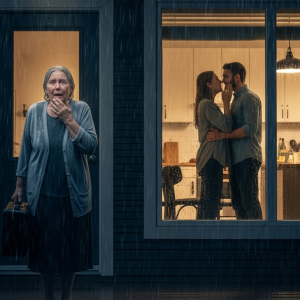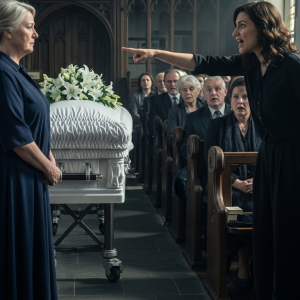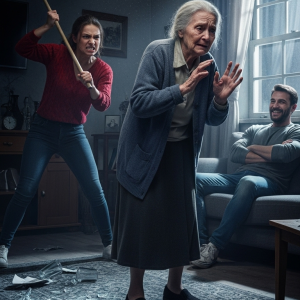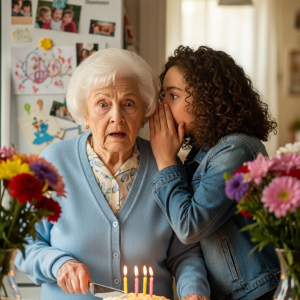They beat me with a leather belt. Not strangers—my own son and daughter. I left the ranch with one dollar in my pocket and a broken rib. For thirty-five years, I had raised them on that land. Now, they called me unfit. I thought I had lost everything that night, but what they didn’t know was that the land they tried to steal would never truly be theirs. Not after what they did.
The house was quiet that morning. Not peaceful, just still. It was the kind of quiet that settles after a storm, when you know the wind hasn’t gone far. I boiled water the way my husband, Victor, used to, the heavy kettle singing on the old stove. He always said coffee should smell like home, not like a machine. It had been seven months since his funeral. My son, Derek, hadn’t visited once. My daughter, Noel, had called twice, both times about the land.
Then yesterday, a text: We’re coming tomorrow. Going to talk about how to keep the ranch going. Going to help you out. That word, help, sat strange in my mouth. Still, I cleaned the guest rooms and dusted the framed photos: Derek holding his first calf, Noel brushing her favorite mare, Victor on the porch in his faded straw hat. The floorboards creaked as I walked, the same sound they made the night we brought Derek home from the hospital. That wood held every season of my life.
At 3:27 p.m., a black SUV rolled up the gravel drive. Derek stepped out first, taller than I remembered. Noel followed, carrying a leather briefcase instead of her old canvas tote. They came in like visitors, not like my children. Derek looked around the room not with nostalgia, but with calculation. He patted the kitchen table once, as if testing its sturdiness, and then sat.
Noel placed her briefcase down, unclicked the latches, and laid out papers like placemats. No hugs, no mention of their father. Just folders, maps, and valuation charts. I stood by the stove, my hands gripping the edge of the sink. Have you ever felt a room shift without anyone saying a word? Like something precious just left through a door that never opened. That was how the visit began. And I knew, whatever they had come for, it wasn’t me.
Noel slid the first paper toward me. The heading read: Preliminary Transfer of Property Rights. I didn’t touch it. Derek leaned back, arms crossed. He said the taxes were climbing, that the fences needed replacing, and that I was too old to manage it all. He said selling a portion of the land—just a few hundred acres of the east pasture—would solve everything and lighten my burden.
Noel nodded, her voice measured and soft, as if that would make the demand more digestible. “It’s not about cutting you out,” she said. “You would still live here, just as you always have. Nothing would change. It just requires a signature.”
I looked down at my hands. The skin had thinned, the knuckles swollen. I remembered every fence post I had hammered into this stubborn earth, every foal I had fed by hand. This land never gave anything easily. It taught us how to stay.
I asked them who was buying. Derek said it was a development group from Reno, planning a green energy project. He claimed it would bring jobs, that it was a generous offer. He made it sound like a gift. I told them I needed time. I didn’t say no, but I didn’t say yes. Derek’s jaw clenched for a fraction of a second before he masked it. Noel slowly gathered the papers.
Once the door shut behind them, I finally exhaled. The house smelled of thyme, rosemary, and something else I couldn’t name. Not smoke, not rot, just the thick, cloying scent of a room that once meant comfort but now meant pressure. I sat in Victor’s chair, the one that still held the indent of his frame, and stared at the original deed we had framed together. I knew then that they hadn’t come home to help. They had come to take.
The knock came before sunrise. Derek stood at the back door, already in his boots. He asked if I could help with a broken latch in the tack room. I dried my hands on my apron and followed him out. The tack room smelled the same as always: leather, dust, and a hint of mold. I walked in first. That was my mistake.
Noel came in behind me and closed the door.
What happened next wasn’t loud. There was no yelling, no rage, just a cold, practiced efficiency. The first crack of the belt caught my side. Derek gripped my arm, forcing me down onto a bench. Noel held my other shoulder. I didn’t hear their words, only the sound of the leather moving through the air. Three, maybe four strikes—enough to bruise and frighten, but not to break bones. I knew that part was intentional.
They stopped when I stopped resisting. I wasn’t crying or screaming. I just stared at a deep scratch in the wood of an old cabinet, a mark Victor had made by accident years ago. When they let go, I stayed sitting. Noel placed the folded papers on the bench beside me. “You can sign it or think about it,” she said, her voice flat. “But next time might not be so easy.”
They left. The door remained open. I sat there long after the overhead bulb stopped humming. My ribs ached when I moved. I walked back to the house slowly, holding my side. I went to the bathroom and lifted my shirt. A purple bruise was already forming beneath my ribs, angry and dark.
That evening, when they left to meet someone in town, I went back to the barn. I took the belt they had used, rolled it tightly, wrapped it in a plastic feed bag, and stuffed it deep under a haystack. Not to hide it. To remember. That night, I slept in Victor’s chair. I didn’t lock the doors, but I moved his shotgun a little closer. They hadn’t just hurt me. They had marked this place, and I knew whatever came next wouldn’t be about land anymore.
The morning after, Derek acted as if nothing had happened. He whistled while making toast. Noel stayed in her room, whispering numbers into her phone. They left before noon. I waited until their car disappeared, then went to the barn. The folder was still there.
Back in the house, I opened it. The maps highlighted our land in numbered sections, labeled for sale. In the margin, Noel had scribbled: Phase One, March. My stomach turned. They were planning to sell it all, in stages. Phase Two, July, included the barn and the south pasture—everything Victor and I had poured our lives into. The signature line was blank, waiting, but the date was already filled in: March 15th. My birthday. That detail was a splinter under my skin.
I didn’t sleep. I moved from room to room, touching the walls, remembering. In the early morning, I pulled out a folder labeled Deed and Inheritance. Inside was a single page Victor and I had drafted fifteen years ago. It wasn’t official, just our notes, but it was enough. The land, we had agreed, should go to someone who would love it. It had to stay whole, or not at all.
I made a phone call, not to a lawyer, but to Edna, a retired friend from the county recorder’s office. I told her I had some questions about private land protections. She said she’d come by with coffee. By the time Derek and Noel returned that evening, I was back at the stove. Noel sat down and looked straight at me. Her voice was low. “We’re moving up the timeline. We need you to sign by the end of the week.” I just stirred the beans and said I’d think about it.
They started treating me like I was in the way. Noel rearranged the pantry, saying it was “more efficient.” Derek took the truck into town without a word. They stopped calling me Mom. I saw Noel’s laptop open to a spreadsheet labeled with acreage and projected revenue. An email draft to someone named Leo mentioned a “pending agreement on southern tract once matriarch signs.” Matriarch. I was a figurehead, an inconvenience they were waiting out.
That Sunday, Edna came by. We didn’t sit in the kitchen; I led her out to the hayshed. She gave me a name: May Campbell, a woman who used to work for the Bureau of Land Management and now did private consulting. She knew about conservation easements and had dealt with bad family land transfers before.
That night, Noel brought out the folder again. “If you don’t sign by Tuesday,” she said, her voice cold, “we’ll have no choice but to go another route. We’ve already spoken to a lawyer. There are ways. We can prove you’re no longer capable of managing this land.”
Her words settled slow, like ash. They were going to try to take it with or without me. That night, I moved everything important—the deed, Victor’s ledgers, the photo albums—to the root cellar, hiding them in a sealed tub behind the potato crates. They thought I was the barrier, the last piece in their way. They hadn’t realized that I wasn’t just a block. I was the foundation, and I was about to shift.
Tuesday morning, I stood at the window and watched a tumbleweed roll across the yard. I set a single coffee cup on the counter, not three. It was a small thing, but it felt like pulling the pin from a quiet grenade. When Derek and Noel came down, she placed the folder on the table, open to the signature line. A black pen lay beside it. “This is your last chance,” she said.
I picked up the folder, closed it, and walked to the pantry, sliding it onto the top shelf behind a tin of flour. I didn’t say a word. Derek exhaled hard and left the room. Noel stared at me for a long moment, trying to calculate how much of me was left to break.
I waited until they drove off, then I retrieved the tub from the root cellar and laid everything out on the dining table. I dialed the number for May Campbell. Her voice was steady and low. I told her I wasn’t ready to file anything yet, but I needed to know what protections I had. She said she could be there the next afternoon.
That night, I opened the old safe in Victor’s office. Inside was a cassette tape labeled For After. I had never listened to it. His voice came through, soft and worn. He talked about the land, about what made a place sacred. “If anything ever goes wrong,” he said, “and you can’t trust our own, make it public. Sometimes shame is more powerful than any court order.” I sat with his words for a long time. I was no longer just someone refusing to sign. I was someone prepared.
The first sign of their next move came quietly. A black SUV rolled up the drive, and a man in a gray blazer introduced himself to Derek and Noel. I watched from the kitchen as they led him inside. An hour later, Derek called me into the dining room. He said they had scheduled a “wellness review,” a third-party evaluation to make sure I was “still capable of making financial decisions.”
The appointment was Friday. A woman with polite eyes and a clipboard asked if I knew what day it was. I told her. She asked who the president was. I answered. Then she asked if I knew where I was. I looked around my kitchen—the yellow walls, the cracked clock—then I looked her straight in the face. “I am standing in the house I paid for, on the land I have worked for five decades, surrounded by people trying to erase me.”
She didn’t write anything down after that. When she left, Derek and Noel’s faces were tight. They knew something had backfired. That night, I sat on the porch, wrapped in Victor’s coat. They weren’t finished yet. But neither was I.
Sunday came with an odd stillness. They set the table for a formal dinner, with candles and cloth napkins. This wasn’t a meal; it was an act. Noel placed a new, slimmer folder beside my plate. “An adjusted version,” she said with a merciful smile. Derek added that a buyer was already lined up. I stood and left the dining room. I went to the office and texted Edna a single word: Ready.
When I returned, I told them the truth. That I had contacted someone about a conservation easement. That any sale would be challenged. And that I had enough documentation to open an investigation into coercion and elder intimidation. Derek turned red. Noel went pale. They didn’t speak. That night, I sat in the kitchen and listened to the house breathe. I wasn’t prey anymore. I was the storm they had called down on themselves.
The next morning, May Campbell arrived in a silver sedan. She handed Derek and Noel a sealed envelope containing the draft easement paperwork and a notice of potential review for elder intimidation. May sat across from me on the couch. “Have you changed your mind about the full conservation filing?” she asked.
“No,” I said. “The land was never meant to be divided. Victor built it whole, and it will stay whole.”
Derek tried to argue, but I took out an old voice recorder. I pressed play. It was the audio from the tack room, captured by a device I’d found later, forgotten under some old receipts. The sound wasn’t graphic, but their cold voices, the calm instructions, and Noel’s threat at the end filled the room. When it ended, May said she was now legally obligated to advise I seek formal protection. I said yes.
By evening, they had packed. No apologies, no explanations. Derek looked back once, his jaw set, but there was nothing left to argue with. They drove off just after sunset. The silence returned like an old friend. The land was quiet again, my name still on it, my breath still in it.
The house exhaled. The tense silence was gone, replaced by an earned peace. I spent the next days returning things to their place. I hammered loose fence boards back in, each nail a reminder that I still had a say here. A letter arrived from the county, a preliminary review confirming my right to hold the property intact as the “primary steward.” I was no longer an obstacle; I was the protector.
Some evenings, I’d pass their empty rooms and feel a quiet ache, but I didn’t let it slow me. I called the music teacher from town and told her the West Barn was open if she ever needed space for her weekend program for kids. She cried on the phone. By Saturday, the barn was filled with the sound of children’s laughter. We didn’t talk about what the place had been. We only talked about what it might become. That night, I sat on the back steps and watched the wind bend the wheatgrass. I didn’t feel abandoned. I felt returned to myself.
A letter arrived from El Paso. It was from Noel. Typed. She said they were stable, that she regretted how things unfolded, that “tensions had been high.” She used the word “miscommunication” more than once. Nowhere did she say she was sorry. Not for the bruises, not for the threats, not for trying to unwrite me from my own story. She ended by saying they might like to visit.
I folded the letter and slid it under a notepad. I didn’t tear it up. I just let it sit, a stone at the bottom of a quiet stream. Peace, once found, is too sacred to reopen old doors. Mine had finally shut. Firm, gentle, and enough.
Spring settled into the fields. The easement paperwork came through, stamped and filed. The ranch would never be sold off in pieces. Its future was secure. One Sunday, an envelope was slipped under the barn door. A thank-you card from one of the kids. He had signed his name in orange crayon and written four words: I feel safe here. I sat with that for a long time. Safe. A word I hadn’t felt in my own bones for years, yet I had given it to someone else just by staying rooted.
I am seventy-two now. My back aches on cold mornings, but I am here fully. Not as a relic, not as a burden, not as a signature waiting to be stolen. I am a woman who stayed. In the end, I wrote the last word, and it was mine. Sometimes, standing your ground becomes the most powerful legacy of all.




